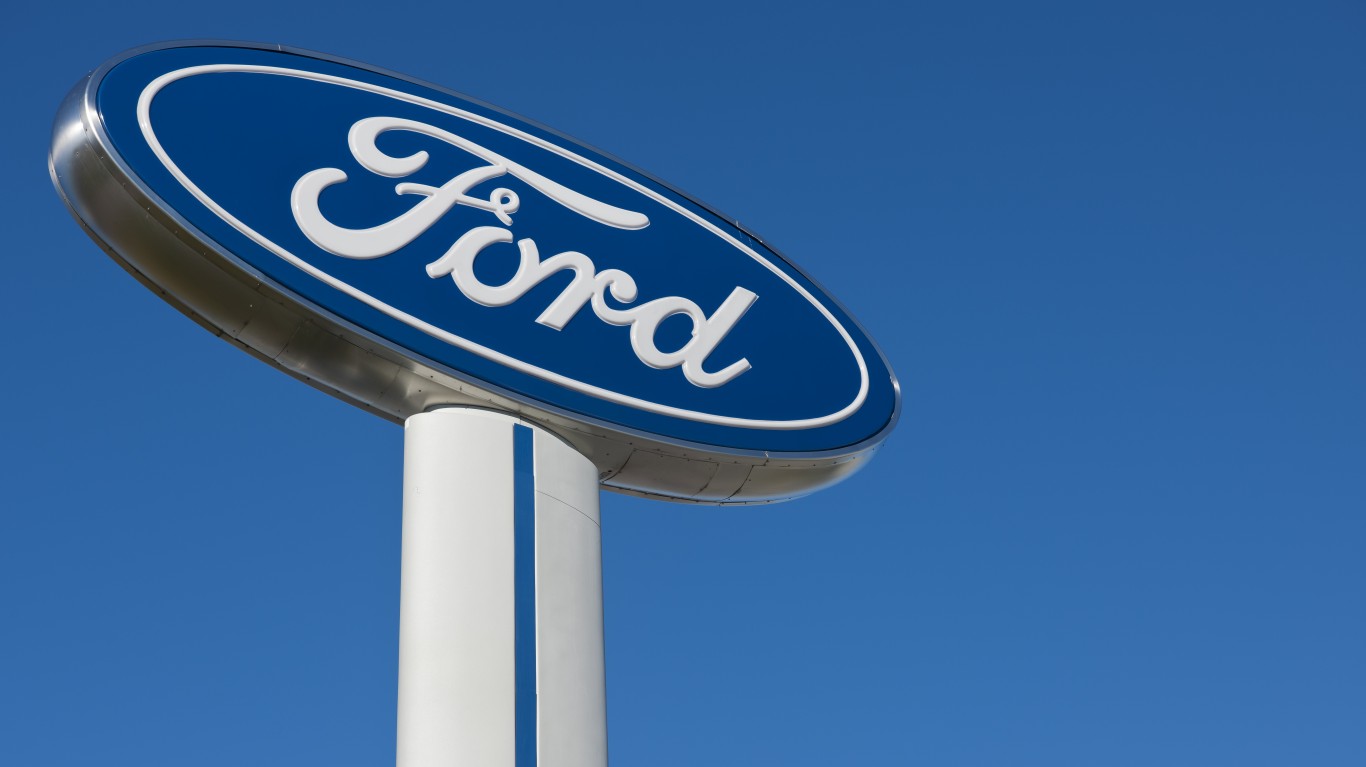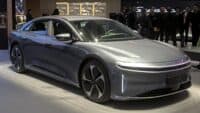 Last year, the government received nearly 30,000 complaints from car owners concerned about potentially dangerous defects with their vehicle. Since 2007, the department responsible for auto safety — the U.S. National Highway Traffic Safety Administration (NHTSA) — has received more than 130,000 complaints.
Last year, the government received nearly 30,000 complaints from car owners concerned about potentially dangerous defects with their vehicle. Since 2007, the department responsible for auto safety — the U.S. National Highway Traffic Safety Administration (NHTSA) — has received more than 130,000 complaints.
Read: Cars with the Most Safety Complaints
The reports range from unintended acceleration to malfunctioning air bags. 24/7 Wall St. reviewed complaints recorded by the NHTSA since January 2007 to identify the 10 car brands with the most safety complaints relative to the number of vehicles they sell.
Following receipt of a complaint, the NHTSA determines whether a particular vehicle has a real, widespread safety concern. If it does, the agency works with manufacturers to issue recalls. While these recalls can force manufacturers to address safety concerns, they also serve to alert consumers to problems. According to several experts interviewed by 24/7 Wall St., once consumers become aware of a recall, they are much more likely to complain about the model to the NHTSA.
In an interview with Panee Segal, Senior Manager of Data Syndication and Support at Edmunds, she explained that many drivers submit complaints about their car because they discovered a problem through media coverage. Referring to the recalls issued by Toyota in 2010, she said, “the media will uncover a story, say for instance the floor mats and stuck accelerator, and consumers will become aware of the NHTSA being an avenue for consumers to file complaints. Consumers read the story and say ‘Hey, I have that complaint, too. Let me send in a complaint for the government to be aware of.’”
24/7 Wall St. reviewed the car models of the brands that received the most complaints recorded by the NHTSA, based on data provided by online automotive information resource Edmunds.com. In nine out of the 10 cases, well-publicized recalls had been initiated on these vehicles. The Prius — part of Toyota’s unintended acceleration fiasco — was the brand’s most complained about vehicle. Similarly, the Murano, Nissan’s most complained about vehicle, had a 360,000-vehicle recall in 2009 due to air ducts that caused the engine to stall.
The effects of recalls, especially well-publicized ones, can be devastating to brand sales and perceived safety. In the first quarter of 2010, Toyota experienced a steep drop in sales following the company’s massive recall. According to a Consumer Reports annual study on consumer identification of auto brands, Toyota’s safety score fell substantially after the incident.
Shaking an image of inferior quality is hard to do, according to Jeff Bartless, Deputy Editor for Consumer Reports, even when the problem is not related to safety. Brands that are perceived to have general, non-safety-related mechanical problems are also more likely to be considered unsafe, Bartless explained. As a result, these cars receive complaints regardless of recalls. Volkswagen and Jaguar, two of the cars with the most complaints — have been considered unreliable for years.
According to Bartless, while the NHTSA bases recalls on safety risk, the car brands with the most complaints also develop issues that require repair unrelated to safety. “Certainly, the more a car breaks down — it is unreliable, problematic, and expensive — that’s definitely going to shape people’s perception, depending on the nature of the problem,” he said.
Edmunds provided 24/7 Wall St. with a comprehensive list of safety complaints issues to the NHTSA by brand and model between January 1, 2007, and August 31, 2012. Included were the most commonly complained about vehicle for each brand over that period, as well as the most common type of complaint given for each brand and model. 24/7 Wall St. also consulted Consumer Reports 2012 Car Brand Perception Report.
These are the 10 cars with the most safety complaints.
10. Scion
> Complaints per 100,000 vehicles sold: 172.3
> YTD car sales: 49,743
> YTD complaints: 71
> Model complaint leader: xB
Toyota’s hip Scion brand, introduced in California in 2003, and then nationwide by 2004, has tiny U.S. market share. Roughly 0.4% of vehicles sold in the U.S. were Scions. The xB, one of the first subcompacts released by the company, has been the most complained about Scion model since 2007, with the most common complaint involving the safety of the body and glass. There were reports, for example, of windows suddenly shattering without apparent cause. Sales of both the xB and Scions in general were down by more than 60% between 2007 and 2011.
9. Chevrolet
> Complaints per 100,000 vehicles sold: 179.4
> YTD car sales: 1,270,582
> YTD complaints: 2,033
> Model complaint leader: Cobalt
Since the beginning of 2007, 17,900 complaints have been filed with the NHTSA, a number that trails only Toyota for total complaints received since 2007. The Cobalt was the most complained about model, with 14% of those complaints involving steering issues. Following NHTSA complaints of sudden loss in power steering, 2005 to 2010 model Chevrolet Cobalts were recalled in 2010 as part of General Motor’s 1.3 million-vehicle recall of Chevrolet and Pontiac cars. After releasing the 2010 model, the Cobalt was discontinued. Chevrolet took another hit in June of this year when GM recalled more than 475,000 Chevrolet Cruzes — the model that replaced the Cobalt — following complaints of engine fires in two 2011 vehicles.
Also Read: The 10 States That Use the Most Energy
8. Nissan
> Complaints per 100,000 vehicles sold: 204.7
> YTD car sales: 697,426
> YTD complaints: 1,290
> Model complaint leader: Murano
Since January 2007, more than 10,000 complaints have been received by the NHTSA regarding Nissans, most frequently for the Murano. In 2009, Nissan had to recall more than 360,000 Muranos due to what the NHTSA described as “premature aging of materials used in the intake air ducts,” which could cause an engine to stall. This year, Nissan recalled 3,000 Muranos after the company discovered that the tire pressure monitoring system, which warns drivers when tires are not properly inflated, had not been activated. Sales of the Murano were down nearly 30% between 2007 to 2011. Muranos have not been the only problem model. Just this month, Nissan recalled 51,000 vehicles, including Qashqai and NV200 models, after the steering wheel in one of the company’s Finnish models detached.
7. Toyota
> Complaints per 100,000 vehicles sold: 215.0
> YTD car sales: 1,199,132
> YTD complaints: 1,450
> Model complaint leader: Prius
Since the beginning of 2007, more than 20,000 complaints have been filed with the NHTSA over Toyota cars, more than any other brand. The brand’s image took a major hit between 2009 and 2011 when millions of Toyota vehicles were recalled. The biggest recall took place in early 2010, and involved more than nine million Toyota and Lexus vehicles, following concerns that loose floor mats could cause gas pedals to stick. In Feb. 2011, the automaker recalled an additional 2.17 million cars over similar concerns. Despite this, Toyota still leads all automakers in brand perception, according to ConsumerReports.org, although that has dropped 17 points since 2011’s study.
Also Read: States Losing the Most Jobs to China
6. Volkswagen
> Complaints per 100,000 vehicles sold: 221.5
> YTD car sales: 286,751
> YTD complaints: 361
> Model complaint leader: Jetta
Since the beginning of 2007, 3,184 complaints have been filed with the NHTSA about Volkswagens. The model receiving the most complaints over that period was the Jetta, with 29% complaints involving the car’s powertrain. VW announced a voluntary safety recall in Oct. 2011 on nearly 160,000 vehicles, many of them Jettas and Jetta SportWagens. Some of the Jetta’s clean diesel engines experienced vibrations that could lead to fuel line cracking, which would then result in a fuel leak. Despite these minor issues, sales of the Jetta are up 82% between 2007 and 2011, and Volkswagen sales as a whole are up 40.7% over the same period.
5. Dodge
> Complaints per 100,000 vehicles sold: 231.6
> YTD car sales: 344,556
> YTD complaints: 1,437
> Model complaint leader: Grand Caravan
The Dodge model with the most complaints since 2007 was the Grand Caravan, with the most common issue being the interior electronics and hardware. In Oct. 2011, Chrysler Group, the parent company of Dodge, announced it was stopping production of both the Grand Caravan and the Avenger. CEO Sergio Marchionne told Automotive News that Chrysler would release a crossover between the Grand Caravan and Avenger for 2013. Dodge’s market share has dropped in the past year, falling from 5.2% in July 2011 to 3.1% in July 2012. Sales were down 37% between 2007 and 2011.
Also Read: America’s Worst Companies to Work For
4. Jaguar
> Complaints per 100,000 vehicles sold: 240.5
> YTD car sales: 8,546
> YTD complaints: 15
> Model complaint leader: XF
The Jaguar model with the most complaints was the XF, with 17% of complaints for that car involving the powertrain. Jaguar recalled about 18,000 X-Type cars in Oct. 2011, which included the XF, due to problems with software. The company released a notice to customers, stating that there could be problems disengaging the cruise control. Sales of the XF were down 40.2% between 2008 and 2011.
3. Chrysler
> Complaints per 100,000 vehicles sold: 292.3
> YTD car sales: 216,616
> YTD complaints: 693
> Model complaint leader: Town & Country
Following the discontinuation of Dodge’s Grand Caravan, the Town & Country will be the sole minivan made by the Chrysler Group. But of the complaints about Chryslers to the NHTSA since the beginning of 2007, no vehicle was more frequently mentioned than the Town & Country. The most common complaint was related to the car’s brakes, with drivers reporting premature wearing of pads. Chrysler’s sales were down by nearly 60% between 2007 and 2011.
2. Jeep
> Complaints per 100,000 vehicles sold: 386.1
> YTD car sales: 325,945
> YTD complaints: 1,321
> Model complaint leader: Wrangler
Wrangler, which represents roughly 30% of the brand’s total sales, received the most NHTSA complaints since 2007, with the fuel emission and exhaust system as the most common complaint. Jeep’s parent company, Chrysler, announced in May that it was recalling about 87,000 2010 model Wranglers after the NHTSA noted that debris could get trapped in the exhaust system, potentially leading to a fire. Just a month later, Chrysler recalled approximately 347,000 Jeep Libertys due to concerns that the lower control arms in the SUV’s rear suspension can rust and cause the vehicle to crash. According to ConsumerReports.org, Jeep’s overall brand perception dropped between 2011 and 2012, but it was in the bottom 10 in both years.
1. Mini
> Complaints per 100,000 vehicles sold: 410.1
> YTD car sales: 43,632
> YTD complaints: 275
> Model complaint leader: Cooper
The Cooper, which represents more than half of the brand’s total sales, was the most complained about Mini model, with concerns over steering comprising 41% of all Mini complaints. In 2010, the NHTSA opened an investigation into the 2004 and 2005 Cooper models following complaints that power-assisted steering often fails. Then in January of this year, parent-company BMW recalled 235,000 Minis following complaints to the NHTSA of fires due to the overheating of the vehicle’s water pump. According to ConsumerReports.org, the Mini brand was tied with Scion and Ferrari as the worst brands for consumer perception safety.
Michael B. Sauter and Samuel Weigley
Also Read: Eight Cheap Cars the Richest Americans Drive
It’s Your Money, Your Future—Own It (sponsor)
Are you ahead, or behind on retirement? For families with more than $500,000 saved for retirement, finding a financial advisor who puts your interest first can be the difference, and today it’s easier than ever. SmartAsset’s free tool matches you with up to three fiduciary financial advisors who serve your area in minutes. Each advisor has been carefully vetted and must act in your best interests. Start your search now.
If you’ve saved and built a substantial nest egg for you and your family, don’t delay; get started right here and help your retirement dreams become a retirement reality.
Thank you for reading! Have some feedback for us?
Contact the 24/7 Wall St. editorial team.




